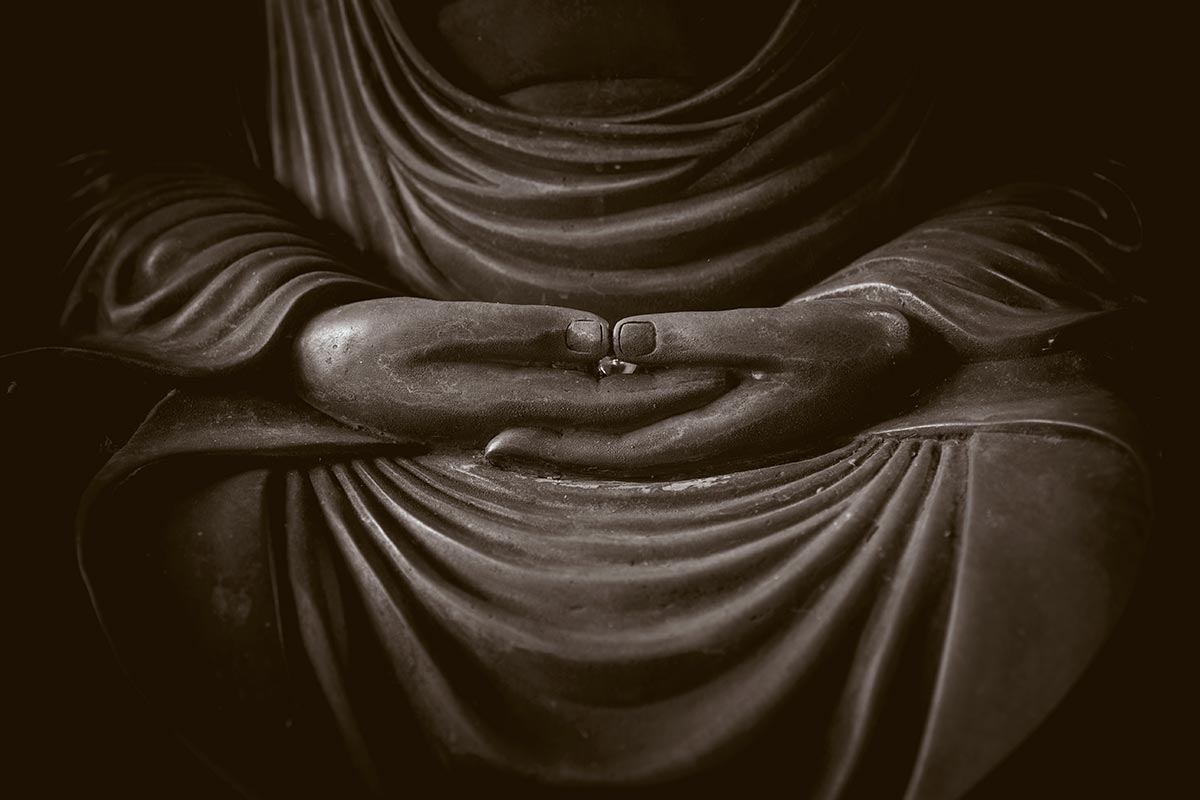Within the framework of the #Stayathome campaign, Casa Asia makes free digital content available to its regular followers and the general public thanks to the collaboration of its network of teachers and experts. On this occasion, we offer a series of video capsules that we have called “Asian Wisdom in times of crisis”, with reflections and advice that, from Eastern philosophies, can help us cope with the current situation, hand in hand with the philosophers Montserrat Simón and Javier Ruiz Calderón. Each expert will provide 4 capsules
We will start with the series starring Montserrat Simón, who offers us a brief overview of each of the qualities that in Advaita Vedanta are required for all applicants to live and rediscover the fullness of life.
These days of confinement can be an invitation to remain silent and pay attention to that background that we usually ignore. Understanding that silence consists precisely in the careful observation of everything that comes and goes, without judgment or pretense. Impartial observation, observation that is limited to verifying what is, is in itself pure lucidity and resting in that lucidity reveals the fullness that we always are.
The first quality is discernment:
1. Discernment
This quality consists of something that seems obvious but that we usually ignore, namely, the distinction between what is temporary and what is eternal. Let’s not assume that there is something that is eternal, we only become aware of everything that is temporary and whatever is left there when we have discarded everything temporary. That is the eternal.
Let us examine the importance we attach to different issues and aspects of life and realize its fleeting nature. Within the transient, let us also examine and shed light on what depends and what does not depend on us. Let us also apply discernment between what brings us closer to a deep peace and joy that does not depend on anything external, and what takes us away from them. It turns out that the attitude that tries to live honestly what is as it appears at each moment, brings us closer to them, the will to look deeply and accept what that gaze gives us step by step and instead moves us away from them. falsehood, the false, the superficiality that moves in the realm of appearances… When I observe and apply discernment from the most honest truth that I am capable of at all times, I realize that the only thing that remains in the midst of everything what is transient is the internal lucidity that allows observation and that lucidity is peace, it is said because it rests on itself. It is eternal because it is outside of space-time logic and is not conditioned by anything.
2. Detachment
This second quality is only understood in light of the first: when we are able to discern the fleeting from what is not, when we discern what depends on us from what does not and what leads us to joy and Truth and What drives us away, we spontaneously abandon most of the desires, or we are replacing them with desires that have more to do with the longing for fulfillment. We begin to see the world from a more global perspective, to understand that the mechanisms of Life are mysterious and are manifested through a continuous appear and disappear, and we stop assigning such crucial importance to certain objects, relationships, circumstances … A child spontaneously detaches himself from his toys as he grows up, in the same way, we naturally detach ourselves when we assume the passing of life and rest in the eternal of the consciousness that looks. The way to apply this detachment is through a lucid look, with discernment, since detachment is its direct consequence.
3. The 6 treasures
· Serenity. We must forge a minimum of mental calm. The simple act of breathing deeply can help us, lengthening the exhalation. When we are nervous and breathe deeply we calm the mind and we can see things with greater equanimity. Serenity also refers here to the ability to focus the mind on a single object.
· Control of the senses. When the mind is minimally calm and there is a certain degree of equanimity, we can then take charge of the senses. The senses are made to connect us with the outside and as they settle on one object and on another our mind tends to identify with those objects. If we have already pacified the mind previously, collecting the senses will be easier since calm itself will ask us for that recollection. Both go hand in hand.
· Stillness. Once the mind is calm and the senses gathered inward, it only remains to rest in the recollection itself and in the consciousness that illuminates it. It is the recollection arising from the abandonment of movement, actions and the senses.
· Resistance. This quality consists in developing in us a certain spirit of endurance, of knowing how to maintain the type in front of the situations that present us in life. Resisting pairs of opposites such as heat and cold is often cited as an example. It is an example that symbolizes the dualities in general towards which we tend to feel affection or rejection, as they generate pleasure or pain. The quality of resistance could be explained with the popular saying “do not drown with a drop of water”, it is about forging equanimity and that is done by observing what we feel, going through it without being dragged away with pleasure or displeasure.
· Trust. Sometimes this quality is spoken of as faith, but it does not have to do with blind faith, but with confidence in the bottom of life that comes from a careful examination and confidence, also, in the teachings we receive from a Master, take this whatever form it takes. The teacher only exists as long as there is someone willing to learn and when we are open and willing to learn, everything around us becomes teaching. Now, it is necessary to trust those teachings, because if the doubt is installed permanently it becomes an obstacle. The determination to trust our fund plays a crucial role here.
· Contemplation. It consists of fixing the mind on that which has no name or form. Once the above qualities have been developed, contemplation arises in the deepest and purest of our being, the contemplation of the luminosity that we are and that is the Reality that sustains everything that is changing and multiple in existence.
Montserrat Simón has a degree in Philosophy from the Autonomous University of Barcelona, a postgraduate degree in History of Religions from the University of Barcelona and a Diploma in Sanskrit from Banaras Hindu University. She studied in India, with the help of scholars and renouncers, the most relevant philosophical traditions of Hinduism and, from a more vital aspect, he has deepened in Advaita Vedanta. He currently teaches courses in eastern philosophies, participates in yoga training and offers philosophical advice with a wisdom approach (www.montserratsimon.com).
Javier Ruiz Calderón is a Doctor of Philosophy, specializing in Indian philosophies and religions and the philosophy of religion. He is a professor of the history of religions, oriental thought, Sanskrit, meditation and Vedic singing. He has published several books: Hinduism and its present time (1996), Dhammapada (2004), Brief history of Hinduism (2008), The Bhagavadgītā (2008), Vedāntasāra: the essence of Vedānta (2009), The religious. For a philosophy of religion (in press). He has lived six years in India, in different academic and spiritual centers. He regularly studies and practices yoga, vedānta and meditation since 1978. Disciple of Svāmī Kṛṣṇānanda (Śivānanda Āśram, Rishikesh) from 1988 to 2001 and of Matā Amṛtānandamayī Devī (Ammā) since 2003.







